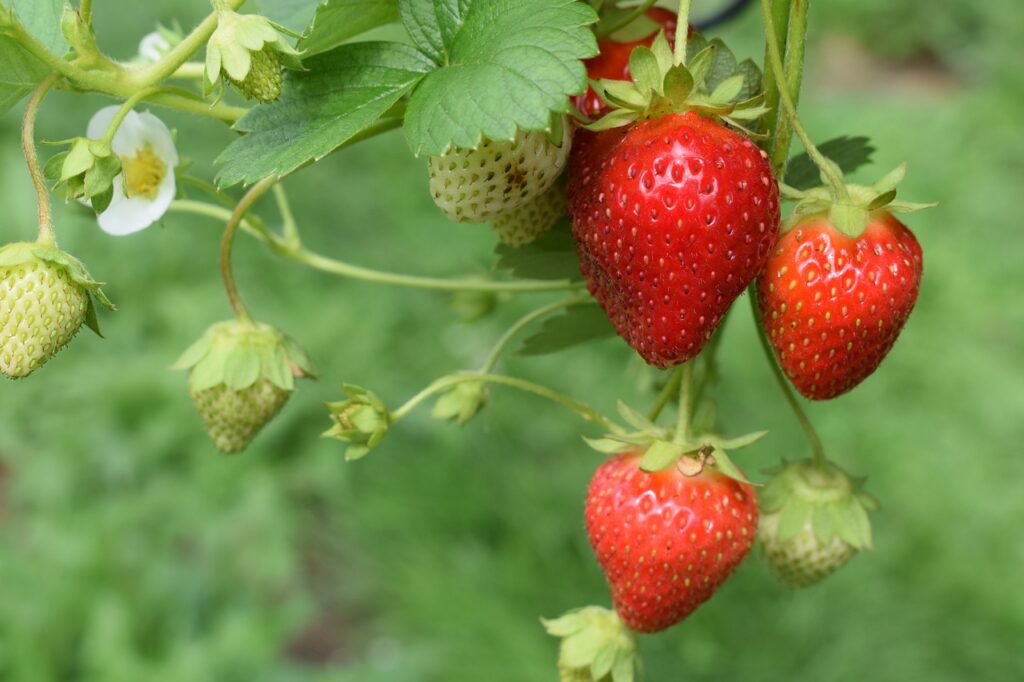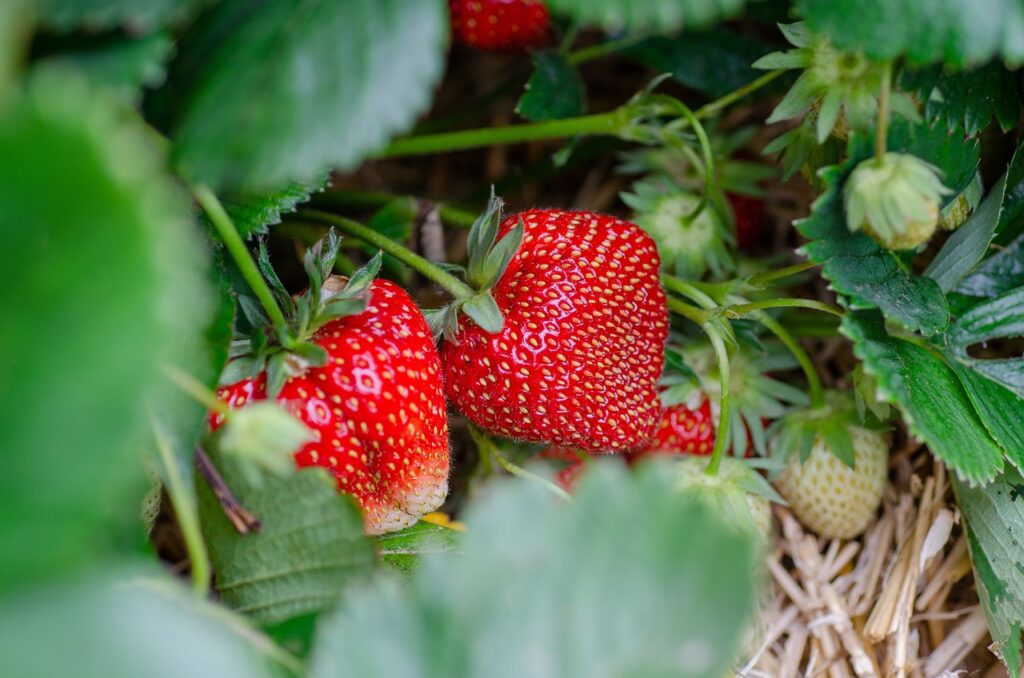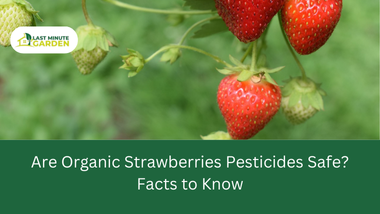Are you concerned about the safety of pesticides used on organic strawberries? The question of whether organic strawberries pesticides are safe is crucial for health-conscious consumers and gardeners alike.
With the rising popularity of organic produce, understanding the implications of pesticide use in organic farming is essential. If you’re considering the safety of pesticides in organic strawberries, you’re in the right place.
This blog will guide you through the facts, benefits, and risks of organic strawberry pesticides.
Understanding Organic Strawberries Pesticides

Organic strawberries are grown without synthetic fertilizers, herbicides, or pesticides, adhering to strict standards set by organic certification bodies. However, this does not mean that no pesticides are used at all.
Organic farmers often resort to natural pesticides derived from plant materials, minerals, or beneficial microorganisms to manage pests and diseases effectively.
Common Organic Strawberries Pesticides
- Neem Oil: Extracted from the seeds of the neem tree, neem oil acts as a natural insect repellent and fungicide. It disrupts insect growth and feeding patterns without harming beneficial insects when used correctly.
- Insecticidal Soaps: These soaps suffocate soft-bodied insects like aphids and spider mites. They are effective against pests while being safe for the environment.
- Pyrethrin: Derived from chrysanthemum flowers, pyrethrin is a potent insecticide that targets a broad range of pests but breaks down quickly in the environment, minimizing long-term effects.
- Bacillus thuringiensis (Bt): This naturally occurring bacterium is used to control caterpillars and other larvae by producing toxins that specifically target these pests without affecting other insects.
Are Organic Pesticides Safe?

The safety of organic pesticides is often questioned, especially concerning their impact on human health and the environment. Here are key points to consider:
- Low Toxicity: Organic pesticides generally have lower toxicity levels compared to synthetic counterparts. They are designed to target specific pests while posing minimal risk to humans, pets, and beneficial organisms in the ecosystem.
- Regulatory Oversight: Organic pesticides must comply with regulations set by bodies such as the USDA National Organic Program. This ensures that any substances used meet safety standards for organic farming.
- Environmental Impact: Many organic pesticides break down more quickly in the environment than synthetic chemicals, reducing their potential for long-term ecological harm. Additionally, they often enhance biodiversity by preserving beneficial insect populations.
- Biodegradability: Organic pesticides often break down more quickly, reducing their long-term environmental impact. They are designed to decompose after performing their job, which is beneficial for both soil health and consumer safety.
- Health Safety: The majority of organic pesticides are safe for human consumption in trace amounts. But thorough washing is still recommended, as residues may remain even on organic produce.
- Targeted Action: Organic pesticides are generally less broad-spectrum, meaning they target specific pests and are less likely to kill beneficial insects or harm pollinators like bees.
The Benefits of Organic Strawberries

Many people choose organic strawberries because they are grown without synthetic chemicals, which can have unknown health effects over time. Here are some benefits to consider:
1. Free from Synthetic Chemicals
Organic strawberries are cultivated without synthetic pesticides and fertilizers. This means they contain fewer harmful chemicals, making them a healthier option for consumption.
The absence of these substances not only contributes to better health but often results in strawberries that taste fresher and more flavorful
2. Environmental Benefits
Choosing organic strawberries pesticides supports sustainable farming practices that promote soil health and biodiversity.
Organic farming methods reduce environmental pollution by minimizing the use of harmful chemicals that can leach into water sources and disrupt ecosystems.
This approach not only helps protect wildlife but also contributes to better soil quality, which is essential for long-term agricultural sustainability.
3. Higher Nutritional Value
Research indicates that organic strawberries tend to have higher levels of essential nutrients compared to their conventional counterparts.
They are rich in antioxidants, particularly vitamin C and phenolic compounds, which play a crucial role in combating oxidative stress and boosting overall health.
A cup of strawberries provides about 160% of the daily recommended intake of vitamin C, which is vital for immune function and skin health.
4. Reduced Exposure to Toxic Chemicals
By opting for organic strawberries, consumers significantly lower their exposure to toxic chemicals associated with conventional farming practices.
For instance, synthetic fertilizers used in conventional agriculture can release nitrous oxide, a greenhouse gas that contributes to climate change. Eating organic helps mitigate these risks and supports a healthier planet
Potential Risks of Organic Pesticides on Strawberries
Despite their advantages, organic strawberries pesticides aren’t entirely risk-free. Here are some factors to keep in mind:
- Misapplication: Organic pesticides can still be harmful if overused. Overapplication may lead to residue buildup that doesn’t wash off easily.
- Allergies and Sensitivities: Although rare, certain natural pesticides like sulfur can cause allergic reactions in sensitive individuals.
- Ecological Concerns: Some organic pesticides, like copper, can accumulate in the soil over time, potentially affecting soil health and microorganisms.
- Limited Regulation and Oversight: Unlike synthetic pesticides, organic pesticides may not undergo the same rigorous testing for safety and efficacy. This can lead to the use of substances that might still pose health risks if misapplied or overused.
Best Practices for Consuming Organic Strawberries
While organic strawberries generally contain fewer harmful substances than conventionally grown strawberries, it’s wise to take some precautions. Here are some best practices:
- Wash Thoroughly: Rinse strawberries under cold running water to remove dirt and potential residues. For enhanced safety, wash them in hot water (around 110°F to 130°F) for about 30 seconds. This method effectively eliminates bacteria and mold spores while preserving the fruit’s quality. Do not soak strawberries in water for long periods, as this can lead to water absorption and loss of flavor. A quick rinse is sufficient.
- Know Your Source: If possible, buy organic strawberries from local farmers who practice responsible pesticide use. This way, you can ask about the types of pesticides used and how often they are applied.
- Opt for Organic: Always select organic strawberries to minimize exposure to harmful pesticides and chemicals. Strawberries consistently rank high on the Environmental Working Group’s “Dirty Dozen” list, indicating they often contain pesticide residues when grown conventionally.
- Consume in Season: Strawberries grown in-season require fewer interventions, meaning there may be less pesticide use overall. Purchase strawberries during their peak season from April through July to ensure they are at their most flavorful and nutritious
Summary
The use of organic strawberries pesticides is an integral part of maintaining healthy crops while adhering to organic farming principles.
When applied correctly, these Organic strawberries pesticides can effectively manage pests without compromising safety for consumers or the environment.
As always, it’s important for consumers to stay informed about agricultural practices and choose products that align with their values regarding health and sustainability.





